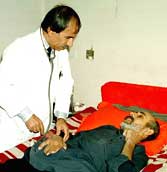| Increasing cancer - All-out effort to save
lives Inadequate medical equipment, medicines |
  Dr. Jawad Al-Ali examins a leukemia patient
in the oncology ward at Saddam Training Hospital.
(Basra) Dr. Jawad Al-Ali examins a leukemia patient
in the oncology ward at Saddam Training Hospital.
(Basra) |
Five a.m. With my guide (34) from the Culture and Information Ministry I leave the hotel for Basra, a city 600 kilometers (375 miles) southeast of Baghdad, in the area that was subjected to the most intense bombing during the Gulf War of 1991.
"I'll take the back roads rather than
the highway." To earn a decent living,
our driver (34), who spoke excellent English,
had quit teaching elementary school and,
in a large American car (1980s), was driving
for hire. The roads he chose ran close to
the Iranian border.
![]() Cancer increasing since the Gulf War
Cancer increasing since the Gulf War
The highway along the Euphrates River is still subject to bombing by US planes on monitoring flights, and is often raided by armed highwaymen.
Along the way, we took a break and got gas at "100 liters (25 gallons) a dollar." We entered Basra just after eleven. After going through the formalities at the local government building, we picked up our local guide (48) and went to Sadam Teaching Hospital, the largest in the city.
"It's been just terrible ever since
the Gulf War. Basra and elsewhere in southern
Iraq have seen enormous increases in respiratory
problems, stomach and intestine problems,
all sorts of serious disorders. Cancer patients
increase every year. I suspect the same thing
happened among the survivors of Hiroshima
and Nagasaki." Speaking was Dr. Jawad
Al-Ali (55), director of the Oncology Center,
who had just returned to his office after
finishing his rounds in the oncology ward.
Having lived for many years in Great Britain,
he returned to Basra, his hometown, in 1984
and began practicing and teaching at this
hospital.
![]() Suspected effects of radiation
Suspected effects of radiation
"In 1988, only thirty-four cancer patients died in hospitals in Basra. Ten years later in 1998, that number was 428. Last year, we reached 500. When I think of the future..."
Jawad's wife's family has had six members contract cancer, beginning with his mother in law. He has already watched three of them die. Leukemia, breast cancer, malignant lymphomas, brain tumors-all are increasing. In addition, they are seeing lung cancer among women, which they almost never saw before, and a conspicuous increase in ovarian cancer and testiclular cancer among the younger generation.
"Ovaries and testicles are very sensitive to radiation and are directly involved in reproductive functions. I suspect the increase in congenital defects is also due to the effects of the radiation and chemical toxicity of depleted uranium (DU)."
The doctor believes that if he could investigate the tissues of patients that contract lung or bone cancer he would confirm high levels of DU, which would support the cause-effect relationship between DU and cancer. However, the hospital today lacks the equipment required to conduct such an investigation.
And Jawad's primary concern is "to save
the lives right in front of me." Speaking
in a lowered voice he adds, "We have
all these cancer patients, and we don't even
have the equipment for radiation therapy
for breast cancer. I know they have a terrible
time coming up with the transportation and
accommodation expenses, so I hate having
to send them all to Baghdad."
![]() In the shadow of economic sanctions
In the shadow of economic sanctions
Radiation therapy is not the only problems. There is a constant shortage of the drugs required for chemotherapy. "Things are a little better since 1997 when the UN Security Council eased the sanctions to allow some oil to be sold for food and medicines. However, chemotherapy requires a combination of medicines to get the effect, and we're always out of something. We inevitably lack one of the three ingredients, so we fall into a vicious cycle."
When I inspected the pharmacy at the hospital in Baghdad, it was obvious that even they were struggling with continual shortages of medicine. Platelets, for example, are indispensable for blood transfusions and various supportive therapies. But there is only one blood separator required to isolate platelets-at the military hospital. Blood must be sent from the blood bank to the military hospital, then returned after separation. This is a tedious and inefficient procedure.
"New cancer patients, including veterans, arrive in this hospital every day. My main concern is to prolong and save their lives. We need a medical system here as soon as possible that can do that. We need the equipment they take for granted in advanced nations."
The economic sanctions are making the building of that medical system extremely difficult. The agony of the patients and of the doctors who know what could be done for them is profound.